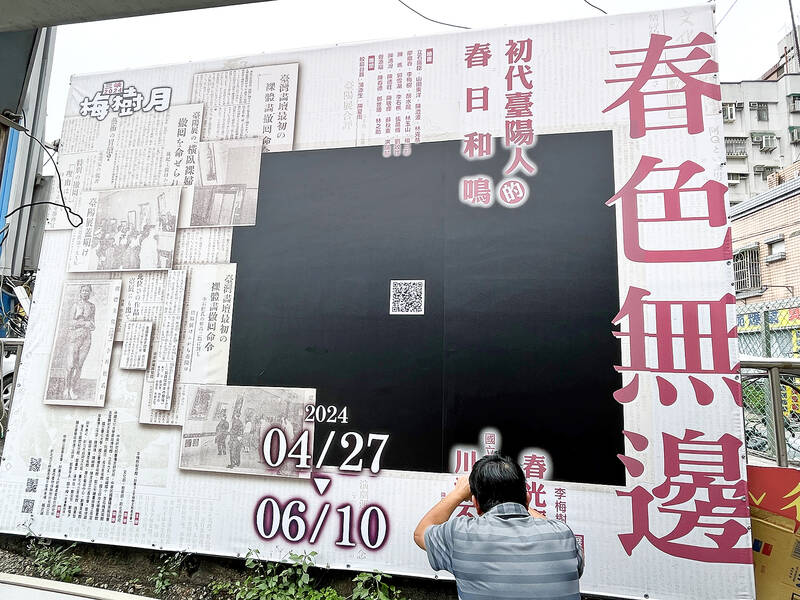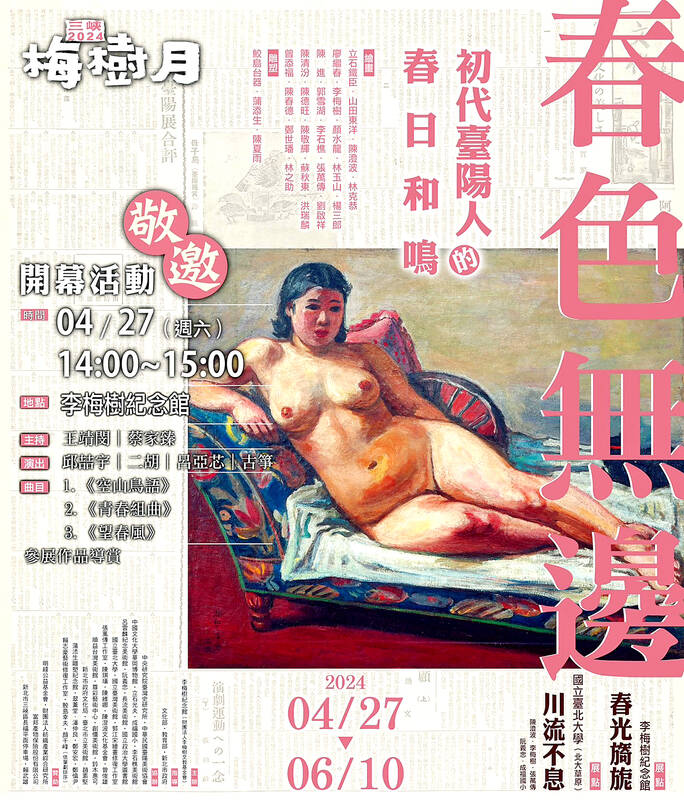A billboard put up by the Li Mei-shu Art Gallery featuring a female nude painting by late artist Lee Shih-chiao (李石樵) was partially censored yesterday following complaints from the parents of students at a nearby elementary school.
The gallery put a QR code on the blacked-out portion alongside a printed copy of a newspaper cutting of a story about how the painting was ordered to be pulled from the exhibit in 1936, to symbolize its stance of making a silent protest.
The gallery, in New Taipei City’s Sansia District (三峽), put up the billboard featuring Lee’s 1936 painting Reclining Nude (橫臥裸婦) in a parking lot last week to advertise its latest exhibition, which commemorates the 90th anniversary of the Tai-Yang Art Association.

Photo: Tung Kuan-yi, Taipei Times
However, complaints followed, with many coming from parents of students at the neighboring Anxi Elementary School.
The QR code links to a statement the gallery put up on Tuesday which said that the exhibit observes the founding principles of the Tai-Yang Art Association, adding that it hoped to provide artists with a platform to present their work and popularize art appreciation.
Lee was part of the group of seven artists who founded the association in 1934, with the goal of developing modern art education in Taiwan.

Photo courtesy of Lee Ching-wen
The statement said that the greatest principle underpinning the association, which also ran private art exhibitions from 1938 to 1944, and resumed in 1948, encouraged artists to express sentiments of loving and cherishing the place where the artist and the audience were raised, with art as the medium.
Lee’s Reclining Nude was also banned from being displayed at the association’s second fine arts exhibition in 1936, the year it was painted, by the Japanese colonial authorities after it was deemed “damaging to public morals.”
The name of the latest exhibition is “Chun se wu bian” (春色無邊), which can be translated as “The boundless colors of spring.”
In Chinese, the word chun se can also have a sexual connotation.
The museum said it chose the name well in advance, and only confirmed it would receive the painting on loan a month before the exhibition opened.
The statement said it arrived at the exhibit’s naming scheme based on two concepts: the first because the Tai-Yang Exhibit was always held in spring, and Li was also born in spring, so the exhibit wished to gather an array of pieces that would highlight Taiwan’s spring; the latter, wubian, meaning boundless, symbolizes artists’ eternal endeavor to achieve the three transcendentals — truth, goodness and beauty.
There is nothing sexual about the exhibition, the statement added.
Gallery foundation chief executive officer Lee Ching-wen (李景文) said the gallery did not wish to cause trouble and acquiesced to the demands.
However, he added that that he hoped those who complained would visit the exhibition to see for themselves what it is about.
While Anxi Elementary School called for the painting to be removed or censored, Chengfu Elementary School, another local elementary school, had a drastically different reaction.
The school’s principal, Hsieh Chi-huang (謝基煌), an art major, said yesterday the incident was an excellent opportunity to teach students how to approach nudity and art.
Senior school authorities explained to students during morning assembly why nudity was prevalent in Western paintings and sculptures, and how students should approach and appreciate the concept.
Hsieh said students were receptive after the explanation, and parents were also understanding.
Asked about the controversy, Beatrice Hsieh (謝佩霓), a curator and art critic, on Monday said that people should be able to distinguish between works of art and pornography, based on the professionalism of the artist.
Hsieh said she was nevertheless shocked that an 88-year-old painting, which “has already entered the public domain and become a part of Taiwanese history,” had caused such a stir.
“If even a piece by an iconic artist like this is questioned, what room does that leave for creativity?” she asked.

TRAGEDY: An expert said that the incident was uncommon as the chance of a ground crew member being sucked into an IDF engine was ‘minuscule’ A master sergeant yesterday morning died after she was sucked into an engine during a routine inspection of a fighter jet at an air base in Taichung, the Air Force Command Headquarters said. The officer, surnamed Hu (胡), was conducting final landing checks at Ching Chuan Kang (清泉崗) Air Base when she was pulled into the jet’s engine for unknown reasons, the air force said in a news release. She was transported to a hospital for emergency treatment, but could not be revived, it said. The air force expressed its deepest sympathies over the incident, and vowed to work with authorities as they

A tourist who was struck and injured by a train in a scenic area of New Taipei City’s Pingsi District (平溪) on Monday might be fined for trespassing on the tracks, the Railway Police Bureau said yesterday. The New Taipei City Fire Department said it received a call at 4:37pm on Monday about an incident in Shifen (十分), a tourist destination on the Pingsi Railway Line. After arriving on the scene, paramedics treated a woman in her 30s for a 3cm to 5cm laceration on her head, the department said. She was taken to a hospital in Keelung, it said. Surveillance footage from a

BITTERLY COLD: The inauguration ceremony for US president-elect Donald Trump has been moved indoors due to cold weather, with the new venue lacking capacity A delegation of cross-party lawmakers from Taiwan, led by Legislative Speaker Han Kuo-yu (韓國瑜), for the inauguration of US president-elect Donald Trump, would not be able to attend the ceremony, as it is being moved indoors due to forecasts of intense cold weather in Washington tomorrow. The inauguration ceremony for Trump and US vice president-elect JD Vance is to be held inside the Capitol Rotunda, which has a capacity of about 2,000 people. A person familiar with the issue yesterday said although the outdoor inauguration ceremony has been relocated, Taiwan’s legislative delegation has decided to head off to Washington as scheduled. The delegation

Another wave of cold air would affect Taiwan starting from Friday and could evolve into a continental cold mass, the Central Weather Administration (CWA) said yesterday. Temperatures could drop below 10°C across Taiwan on Monday and Tuesday next week, CWA forecaster Chang Chun-yao (張竣堯) said. Seasonal northeasterly winds could bring rain, he said. Meanwhile, due to the continental cold mass and radiative cooling, it would be cold in northern and northeastern Taiwan today and tomorrow, according to the CWA. From last night to this morning, temperatures could drop below 10°C in northern Taiwan, it said. A thin coat of snow